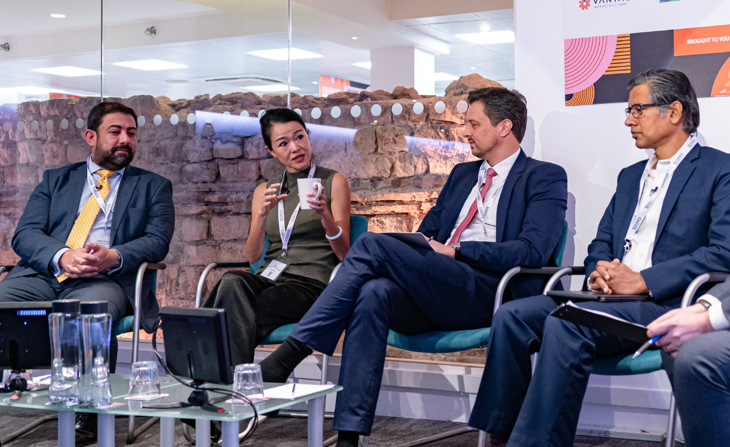
The problems in risk management aren’t new – and the risks aren’t new either. These sentiments were expressed during a panel discussion at the Insurance Investor Live | Europe 2023 event, held Wednesday in London.
A panel of several senior industry figures, including Ashish Dafria, Chief Investment Officer, Aviva, Christian Wegener, Global Head of Investment Solutions, HSBC Life, Adam Ruddle, Chief Investment Officer, LV, and Wei Li, Global Chief Investment Strategist, BlackRock.
The panel participants were asked about the challenges and opportunities for insurers in 2024 and beyond – to which Dafria said three specific areas jumped out as the most important to consider.
“The first is sustainability,” he said. “[The topic] can be frustrating at times because it can feel religious – you’re either devout or an atheist – but it does have significant risks and opportunities.”
He added that the second, more important topic was liquidity, especially as risk premiums have shrunk.
The third topic was inflation, which he said was causing some interesting decisions to be made in regard to what needed to be done to bring rates back to more manageable levels. “Just because it feels like a new regime doesn’t mean everything that we do needs to be new,” Dafria said.
“Just because it feels like a new regime doesn’t mean
everything that we do needs to be new."
The panel was then asked about how to rise to the inflation and interest rate challenges – all while adapting asset allocation strategies for uncertain outcomes.
Ruddle reiterated that the discussion around inflation did seem to be missing some of the essential elements – especially around how the current situation fits in with cycles. “Inflation does feel like a new regime, but we can’t get hasty,” he said.
He continued, saying that one area his company was interested in exploring further was commodities, which “may start to get interesting”.
“You need to think about what your strategy is and what your policyholders are expecting,” he said, however, warning for caution. He reiterated that current market conditions around interest rates made looking at new opportunities slightly more difficult. “There isn’t a lot of upside risk on interest rate strategies, so we need to hedge,” he said.
Li said it was important to look at and understand the ‘mega forces’ that were at play in the global macroeconomic sector to fully understand long-term trends – and then benefit from them.
She listed private credit, energy markets, and infrastructure debt as areas to watch for opportunities to achieve returns in 2023.
“Macro may not always be our friend, but mega trends can be,” she said.
The panellists were asked where they expected to see movement in 2024 when it comes to asset classes.
Dafria said he wanted to further monitor nature investment – especially around biodiversity, which had a lot of unexplored areas. “But we also need to think about risk allocation in consumer and retirement funds,” he said. “How can we make pension investment funds more sensitive to risk?”
“How can we make pension investment funds
more sensitive to risk?”
Ruddle agreed that, in the future, exciting investment areas could be asset classes such as infrastructure. “But there are some questions around how much further do we want to diversify and are there other asset classes we need to get into,” he said.
He also listed private markets as an arena he saw no end in movement toward.
Li said that “digging under the hood” was important, as there was currently a “narrow story” around equities when looking at future capabilities. She warned the audience to not “get carried away with headlines”, especially as related to development and index appreciation.
Li said she was interested in exploring Artificial Intelligence (AI) as a potential future area for investment – but that it was an area that would have different themes in the developed markets versus emerging markets.
“We’re overweight with AI in developed markets,” she said. “We’re not getting out of it, and it’s come a long way, but we need to look toward chips and infrastructure. There are other ways of playing the AI theme.”